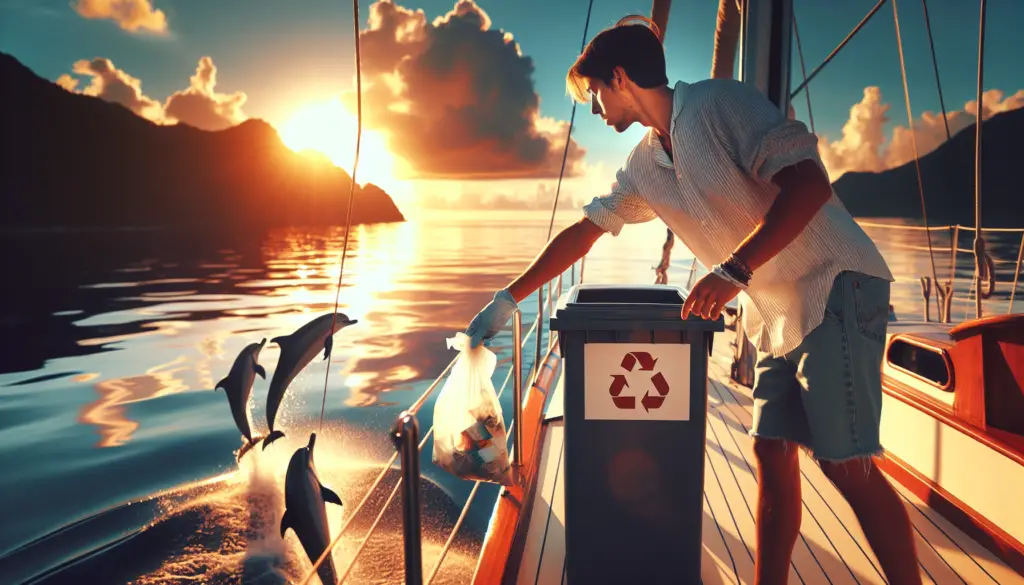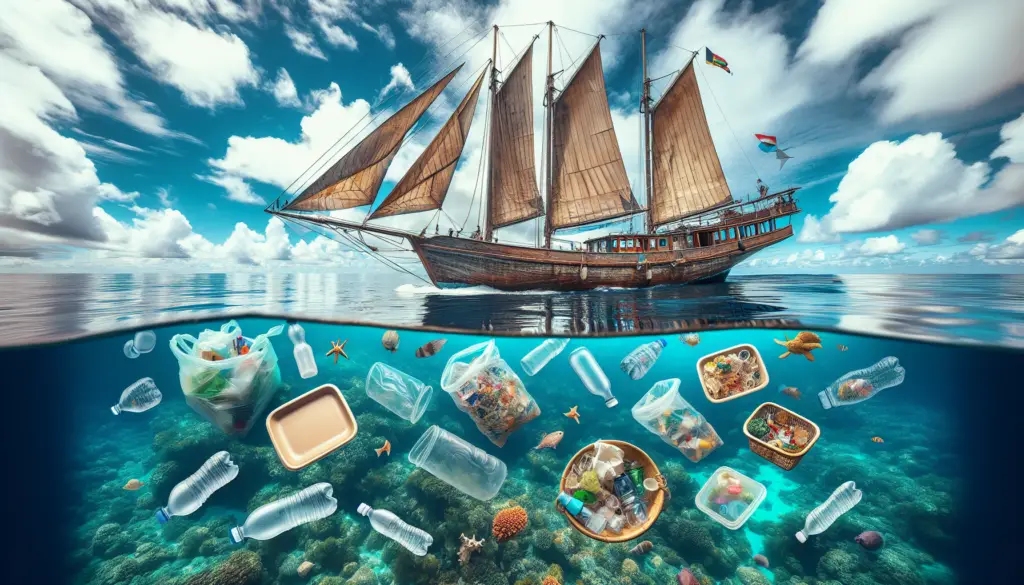As a boater, the beauty of the open water is probably one of the reasons you love this pastime. But, have you ever considered your role in preserving that beautiful, pristine environment? Responsible waste management is a critical aspect of protecting our oceans, rivers, and lakes. “Responsible Waste Management for Boaters” is a detailed article designed to enlighten you on how to diminish the impact of your boating activities on these precious waterways while taking your love for boating to a conscientious level.

Understanding The Importance of Responsible Waste Management
It’s no secret that boating can have significant environmental impacts, whether they’re caused by the discharge of waste, fuel usage, or the materials used in the boat itself. This is why it’s so important for you, as a boater, to practice responsible waste management.
The link between boating and environment
When you’re out on the open water, it’s easy to forget about your impact on the environment. But the truth is that everything you do, from the fuel you burn to the waste you produce, affects the marine and coastal ecosystems around you. Boating can contribute significantly to water pollution, which in turn harms marine life and destroys aquatic habitats.
Impacts of irresponsible waste disposal
When waste is not properly managed, it can pose significant threats to the environment. This includes both physical waste and liquid waste, such as sewage, which can contain harmful bacteria and toxins. Irresponsible waste disposal can cause water contamination, loss of biodiversity, and physical injury to marine animals.
Preserving marine life
By practicing responsible waste management, you can help to preserve marine life and ecosystems. This means not only reducing the amount of waste you produce but also ensuring that any waste you do generate is properly and safely disposed of or recycled.
Benefits of responsible waste management for boaters
Apart from environmental benefits, responsible waste management can also provide legal and financial advantages for boaters. Many regions have strict waste disposal regulations, and non-compliance can result in hefty fines. Additionally, by reducing waste and properly managing what they do produce, boaters can save money on waste disposal costs and avoid potential damage to their vessels and reputations.
Types of Waste Generated on Boats
Boats typically generate four main types of waste: solid waste, liquid waste, hazardous waste (which can be either solid or liquid), and organic or biodegradable waste.
Types of solid waste
Solid waste on a boat can include food waste, packaging, disposable utensils, and other garbage. While some of this waste might be biodegradable, other pieces could take years or even centuries to decompose, leading to long-lasting environmental damage.
Liquid waste and its impacts
Liquid waste, such as sewage and wastewater from sinks and showers, can contain harmful substances like detergents, oil, and human waste. If disposed of improperly, these can contaminate water sources and harm marine life.
Hazardous waste and their risks
Hazardous waste on a boat can include fuels, batteries, oil, paint, antifreeze, and cleaning fluids. These types of waste carry specific risks due to their potential for toxicity, flammability, and damaging reactions with other substances.
Biodegradable Vs Non-biodegradable waste
The difference between biodegradable and non-biodegradable waste is an important one for boaters. Biodegradable waste, like food scraps, can break down naturally over time without causing much harm. Non-biodegradable waste, however, persists in the environment, leading to pollution and harm to wildlife.

Laws and Regulations for Boaters
There are numerous laws and regulations in place to govern waste management on boats. These can range from international conventions to local laws and regulations.
International waste management regulations
Globally, the International Maritime Organization (IMO) sets out the international regulations for waste management on boats. These include provisions for the reduction and control of pollution from ships, as well as the disposal of garbage at sea.
Country-specific regulations for waste disposal
In addition to international regulations, there may also be country-specific laws governing waste disposal. These can vary widely from country to country, so make sure you’re familiar with the local regulations wherever you’re boating.
Penalties for violation of waste management laws
The penalties for violating waste management laws can be hefty. These can range from fines to the suspension or revocation of your boating license. So it’s in your best interest to make sure you’re compliant with all waste management laws and regulations.
Principles of Responsible Waste Management
When it comes to responsible waste management, there are a few key principles to remember: reduce, reuse, recycle; proper segregation; safe disposal; and reducing consumption.
The 3Rs: Reduce, Reuse, Recycle
This tried-and-true ethos is a solid starting point. Reducing the amount of waste you generate in the first place is key. If you can’t reduce, aim to reuse items as much as possible. And recycle what you can’t reuse.
Importance of proper segregation
Segregating waste into different categories not only helps in recycling but also ensures that hazardous and non-hazardous waste doesn’t get mixed, reducing the environmental impact.
Safe disposal of hazardous waste
Hazardous waste needs to be handled with extra care. Always store hazardous waste safely, away from other waste, and ensure it is disposed of at a designated disposal facility.
Reducing consumption to minimize waste
Lastly, it’s worth remembering that the best way to reduce waste is not to produce it in the first place. Aim to consume less, choose products with less packaging, and use reusable items wherever possible.

Implementing Waste Segregation on Boats
Implementing waste segregation on a boat involves a few key steps: deciding on a segregation system, acquiring the necessary tools and equipment, and training crew members.
Steps to segregate waste
First, decide on a system for segregating waste. This could be based on the type of material (plastic, glass, metal, organic, etc.), its recyclability, or hazardousness. Then, set up separate, clearly labeled bins for each type of waste.
Tools and equipment for waste segregation
The tools and equipment you’ll need for waste segregation will depend on your chosen system. At a minimum, you’ll need separate, clearly labeled bins for each type of waste. You may also need special containers for hazardous waste or a dedicated compost bin for organic waste.
Training crew members in waste segregation
Once you’ve set up your system, it’s essential to train all crew members in its use. Make sure everyone understands why waste segregation is important and how to properly dispose of each type of waste.
Proper Disposal of Solid Waste
The proper disposal of solid waste involves two main steps: figuring out your disposal options and ensuring that your disposal methods don’t cause pollution.
Disposal options for solid waste
Your options for disposing of solid waste will depend on the type of waste and your location. You might be able to compost organic waste, recycle recyclable waste, and dispose of non-recyclable waste at a designated disposal facility.
Ensuring waste disposal does not cause pollution
Regardless of your disposal methods, it’s crucial to ensure that they don’t cause pollution. Always dispose of waste properly, according to local laws and regulations, and never throw waste overboard.

Managing Liquid Waste and Sewage
Managing liquid waste and sewage on a boat can be a tricky business. At a minimum, you should always ensure not to discharge untreated sewage, and if possible, install an on-board treatment system.
Options for managing liquid waste
Options for managing liquid waste can vary, but at the very least, you should always ensure not to discharge untreated sewage into the water. You may be able to discharge processed wastewater (from sinks, showers, dishwashers, etc.) overboard, though some areas prohibit this. Always check local regulations.
Importance of not discharging untreated sewage
Discharging untreated sewage can seriously harm marine life and water quality. That’s why it’s banned in many areas and generally regarded as a bad practice everywhere.
On-board sewage treatment systems
On-board sewage treatment systems are one way to manage sewage on a boat. These systems treat sewage before releasing it, making it safer for the environment.
Proper Disposal of Hazardous Waste
The key to properly disposing of hazardous waste is to treat it with the respect it deserves. This means storing it safely, disposing of it at designated facilities, and understanding the risks it poses.
Types of hazardous waste
Hazardous waste on a boat can include fuels, batteries, cleaning fluids, paint, oil, and antifreeze. Because of their potential to harm both people and the environment, these are all items that you should handle and dispose of with care.
Importance of special disposal methods for hazardous waste
Hazardous waste requires special disposal methods to ensure it doesn’t harm the environment or pose a risk to people. Always dispose of hazardous waste at a designated disposal facility, never overboard.
Hazardous waste collection facilities
Many marinas and harbors offer hazardous waste collection facilities. These facilities safely and legally dispose of the hazardous waste. Always ask about these facilities when you’re docking somewhere new.
Involving Crew Members in Responsible Waste Management
Involving crew members in waste management is vital to making it successful. This involves education, training, and potentially incentives for good behavior.
Importance of crew involvement
The crew can be your biggest allies in responsible waste management. They’re the ones who produce most of the waste and therefore have the most control over how it’s managed.
Educating crew members about waste management
Education is key to getting crew members on board with your waste management efforts. Make sure everyone understands why it’s important and what they can do to help.
Incentives for crew involvement in waste management
Consider offering incentives to encourage crew involvement in waste management. This could be anything from simple recognition to small rewards for those who go the extra mile.
Innovations and Technology in Responsible Waste Management
Innovations and technology are playing an increasingly important role in responsible waste management. From new ways to reduce and recycle waste to the latest onboard treatment systems, there’s a lot to keep track of.
Innovative waste management solutions for boats
In recent years, several innovative solutions have appeared that can help you manage waste on your boat. These include compactors that can reduce the volume of waste, composting toilets that turn waste into a usable soil, and improved recycling systems.
Use of technology in waste management
Technology can also play a key role in waste management. For example, some modern boats are equipped with advanced treatment systems that can process wastewater and sewage to such a degree that it can safely be discharged.
Future trends in responsible waste management for boaters
Looking ahead, it’s likely that we’ll see even more focus on responsible waste management in boating. This could mean everything from new laws and regulations to advances in waste reduction and recycling technology. So it’s essential to stay up-to-date. After all, responsible waste management is not just good for the environment, it’s good for you and your boat too.


[…] Store used oil in tightly sealed containers and keep them in a cool, dry place. Avoid placing the containers where they might tip over or get damaged. […]
[…] your boat in a manner that reduces your impact on the environment. This includes practices like proper waste management, minimizing boat maintenance activities in the water, and avoiding sensitive marine […]